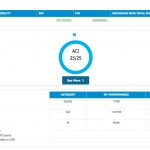The ACR has been at the forefront of helping rheumatologists meet practice demands, including federal reporting requirements. The first registry that helped meet these requirements was the Rheumatology Clinical Registry (RCR), and it facilitated quality reporting, but required manual entry of required data. More recently, ACR has contracted with FIGmd to create a tool that helps rheumatologists capture, analyze and share important clinical practice information without creating the burden of manual data entry. Moreover, the ACR wants to promote quality using indicators that are relevant to rheumatologist practices.
RISE (Rheumatology Informatics System for Effectiveness) is an online registry that automatically captures data from individual electronic health record systems (EHRs) and provides information that meets the new federal reporting requirements of the Medicare Access and CHIP Reauthorization Act of 2015 (called MACRA, for short). Currently, RISE captures data on more than 2.5 million patient encounters. RISE can deliver analytics and practice insights to rheumatology health professionals. RISE has become an integral part of more than 200 rheumatology practices, both large and small. And as we prepare for the implementation of paradigm-shifting federal legislation, this powerful, high-tech tool, which the ACR does not charge its members to utilize, is more important than ever.
In my April column, I wrote about MACRA. Signed into law in April 2015, MACRA has broad implications for rheumatologists. Not only does the legislation fundamentally alter Medicare reimbursement, but it also requires physicians to choose one of two payment paths by Jan. 1, 2017. One option is the so-called Merit-Based Incentive Payment System (MIPS), in which physician payments will be adjusted on the basis of performance and patient outcomes.
RISE-ing to the Need
Here’s where RISE comes in. If rheumatologists are to be paid on the basis of performance measures, they need to know how they’re performing. And, fortunately, the data analytics that RISE provides can do just that; RISE allows users to self-assess, by analyzing data on demographics, medications, lab data, disease activity, functional status and other metrics directly from their electronic health record. In addition, clinicians can benchmark these data within the group practice and/or nationally to other practices connected to RISE. With these powerful analytics, physicians can keep a watchful eye on key clinical quality measures, align themselves with best practice standards and understand what they need to do to not only meet, but exceed national averages.
RISE, therefore, allows providers to see themselves in the context of clinical quality improvement. The registry lets a practitioner review current quality metrics and adjust their practice delivery appropriately to optimize quality care for the patients they serve.

